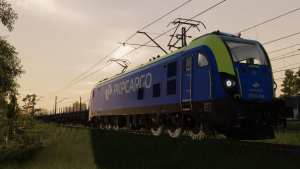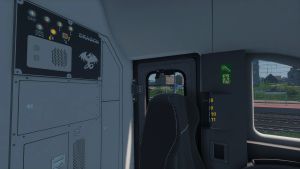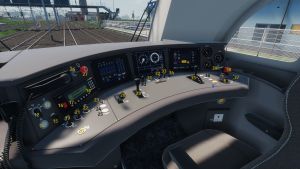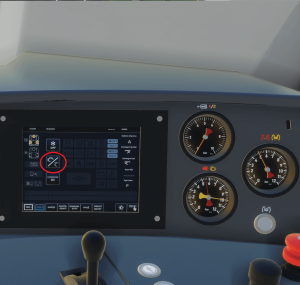Электровоз ET25: Difference between revisions
No edit summary |
No edit summary |
||
| Line 39: | Line 39: | ||
''Серийные номера локомотивов доступных для управления:'' | ''Серийные номера локомотивов доступных для управления:'' | ||
* | * ET25-002 | ||
* E6ACTa-014 | * E6ACTa-014 | ||
* E6ACTa-016 (Cargounit) | |||
* E6ACTadb-027 | * E6ACTadb-027 | ||
| Line 47: | Line 47: | ||
*Максимальная скорость 120 км/ч | *Максимальная скорость 120 км/ч | ||
*Максимальная скорость на дизельном ходу 40 км/ч | *Максимальная скорость на дизельном ходу 40 км/ч | ||
*'''Locomotive includes ETCS interlocking.''' | |||
== Кабина машиниста == | == Кабина машиниста == | ||
| Line 187: | Line 188: | ||
The locomotive is currently free of any faults. | The locomotive is currently free of any faults. | ||
===Brake modes=== | |||
There are three braking modes: '''P''', '''G''' and '''R'''. '''P''' and '''R''' are for passenger trains, while '''G''' is for freight trains. [https://de.wikipedia.org/wiki/Bremsart <nowiki>[2]</nowiki>] | |||
<span id="Galerie"></span> | The difference between '''P''' and '''R''' is the strength of the braking effect. In '''P''' mode it is around 110%, in '''R''' it is much higher (depending on the wagons it can be close to 200%). | ||
{| class="wikitable" | |||
|+ | |||
!Mode | |||
!Usage | |||
!Determined speed [http://www.iwan.eu07.pl/jw/john_woods2009/predpisy/V/V15.pdf <nowiki>[3]</nowiki>] | |||
!Full braking time | |||
!Brake release time | |||
|- | |||
!P | |||
|Passenger trains | |||
|89 km/h or lower | |||
|3-5 sec | |||
|10-20 sec | |||
|- | |||
!R | |||
|Passenger trains | |||
|90-160 km/h | |||
|3-5 sec | |||
|10-20 sec | |||
|- | |||
!G | |||
|Freight trains | |||
| - | |||
|18-30 sec | |||
|45-60 sec | |||
|}<span id="Galerie"></span> | |||
==Gallery== | ==Gallery== | ||
| Line 199: | Line 228: | ||
File:et25new.png | File:et25new.png | ||
</gallery> | </gallery> | ||
==Reference== | |||
*[https://cs.wikipedia.org/wiki/Newag_Dragon <nowiki>[1]</nowiki>] - Wikipedia link | |||
*[https://de.wikipedia.org/wiki/Bremsart <nowiki>[2]</nowiki>] – Bremsart – Wikipedia | |||
*[http://www.iwan.eu07.pl/jw/john_woods2009/predpisy/V/V15.pdf <nowiki>[3]</nowiki>] – ČD V15 – Regulation for the operation and maintenance of braking equipment on railway vehicles | |||
Revision as of 20:34, 7 October 2023
The electric locomotive is known as the ET25 Dragon, manufactured in Poland.

Locomotive in reality
Newag Dragon is a family of six-axle locomotives manufactured by the Polish manufacturer Newag Gliwice since 2009. Of the modifications offered, only electric DC locomotives are in service in 2015.
The locomotive was created as a joint project of the locomotive repairer Zakłady Naprawcze Lokomotyw Elektrycznych (ZNLE) (later Newag Gliwice) in cooperation with Instytut Elektrotechniki Warszawa and the design office EC Engineering. The locomotive was developed in response to specific Polish conditions, where operators prefer heavy trains, for which a six-axle locomotive is more suitable than the more common four-axle locomotives in Western Europe (e.g. Siemens EuroSprinter or Bombardier TRAXX).[1]
Locomotive parameters
| Тип тяги | Electric | Максимальная мощность | DC 5000 kW / AC&MS 7200 kW |
|---|---|---|---|
| Тип двигателей | STX500-4A
ABB AMXL450 |
Максимальная тяга | 375-450 kN |
| Количество двигателей | 6 | Максимальная скорость | 120 Km/h |
| Род тока | DC 3 kV
AC dual mode 15 kV & 25 kV MS triple mode 3 kV DC, 15 kV & 25 kV AC |
||
In-game locomotive

This electric locomotive in the game was added in the EA (Early Access) version, and players can run this locomotive as part of freight trains.
Серийные номера локомотивов доступных для управления:
- ET25-002
- E6ACTa-014
- E6ACTa-016 (Cargounit)
- E6ACTadb-027
Базовые параметры локомотива
- Максимальная скорость 120 км/ч
- Максимальная скорость на дизельном ходу 40 км/ч
- Locomotive includes ETCS interlocking.
Кабина машиниста


| 1. | n/a | 21. | Передний пантограф |
| 2. | n/a | 22. | Главный выключатель |
| 3. | Тест системы пожаротушения | 23. | Режим работы буферных фонарей |
| 4. | Сброс системы пожаротушения | 24. | Поднять подставку для ног |
| 5. | Освещение моторного отсека | 25. | Опустить подставку для ног |
| 6. | Активация стояночного тормоза | 26. | Активация кабины |
| 7. | Отключение стояночного тормоза | 27. | Аварийный выключатель |
| 8. | Local brake | 28. | Регулировка круиз-контроля |
| 9. | Кнопка бдительности машиниста | 29. | Контроллер машиниста |
| 10. | Гудок (высокий тон) | 30. | Sanding |
| 11. | Освещение кабины | 31. | Brake releaser |
| 12. | Переключатель стеклоочистителей | 32. | Регулировка яркости освещения кабины |
| 13. | Омыватель лобового стекла | 33. | Освещение панели приборов |
| 14. | Освещение панели приборов | 34. | Регулировка яркости освещения панели приборов |
| 15. | Регулировка яркости освещения панели приборов | 35. | Пневматический тормоз |
| 16. | Radiostop | 36. | Направление движения |
| 17. | Отключение радиостанции | 37. | Гудок |
| 18. | Включение радиостации | 38. | Экстренный тормоз |
| 19. | Задний пантограф | 39. | Отпуск тормозов |
| 20. | ETCS |
Процедура запуска
- Войти в кабину
- Активировать кабину
- Нажать на кнопку бдительности машиниста
- Поднять задний пантограф
- Нажать и кратковременно удерживать кнопку главного выключателя
- Включить радиостанцию
- Выключить стояночный тормоз
- Включить буферный фонари
- Выбрать направление движения нажатием на кнопку
- Удерживать рукоять пневматического тормоза в положении "Отпуск" до полного отпуска тормозов
- Предупредить диспетчера о готовности к работе
- Вы готовы к движению. Регулируйте тягу контроллером машиниста
- Using the Num - key or reducing power on the controller will reduce the locomotive power and then we can brake the train or apply the electrodynamic brake.
Cold start procedure - Diesel engine
- Enter the cabin
- Activating the cabin
- On the right monitor - switch the motor/pantograph button
- Turn on the HV switch and hold the button for a moment.
- Turn on the radio station
- Now, switch off the locomotive handbrake, where the button is located on the rear wall of the cab.
- Switch the lights to the forward position.
- Set the train's direction of travel - Forward
- Switch and hold the brake in the "Reduce braking force" position and wait until the braking force is at 0%.
- Click ZEW3 button on the radio to confirm the train is ready to the dispatcher.
- Now it's time to move. Either use the controller (left) or the Num + key to add power.
- Using the Num - key or reducing power on the controller will reduce the locomotive power and then we can brake the train or apply the electrodynamic brake.
Locomotive faults
The locomotive is currently free of any faults.
Brake modes
There are three braking modes: P, G and R. P and R are for passenger trains, while G is for freight trains. [2]
The difference between P and R is the strength of the braking effect. In P mode it is around 110%, in R it is much higher (depending on the wagons it can be close to 200%).
| Mode | Usage | Determined speed [3] | Full braking time | Brake release time |
|---|---|---|---|---|
| P | Passenger trains | 89 km/h or lower | 3-5 sec | 10-20 sec |
| R | Passenger trains | 90-160 km/h | 3-5 sec | 10-20 sec |
| G | Freight trains | - | 18-30 sec | 45-60 sec |
Gallery
- Screenshots from the game (without zoom)






